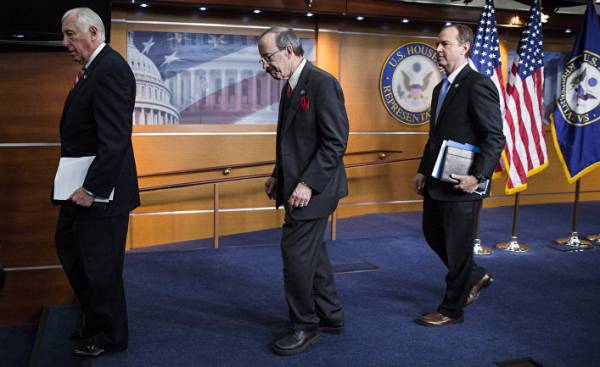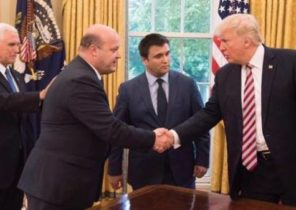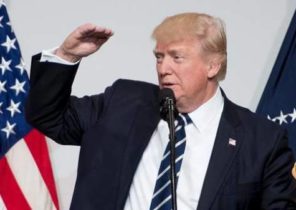
Signed last week by President trump the law on new sanctions against Russia (Сountering America’s Adversaries Through Sanctions Act, H. R. 3364) is actively discussed from different points of view. Then and empowerment to influence the Russian elite is using surveillance and reports prescribed by the act. And expansion budget on counter-propaganda, perhaps more effective than during the cold war. Cassandra, predicts the imminent collapse of the “bloody regime”, promise a massive sale of Russian debt, the seizure of Russian assets in the US and (for some reason) the European Union, cutting the channels of financing to private companies and the financial zombie Apocalypse.
About the same nightmares promised three and two years ago, pop-UPS, in social networks the old projections cause the banter Patriotic public. However, whether this law is really toothless, he would hardly have collected so large a majority in Congress that the President trump simply had no opportunity to reject it — except to challenge from a constitutional point of view in the Supreme court. So it is as close as you can to understand what to expect in the coming months and years.
Short-term effects are likely to be subtle. The law prescribes no specific measures but rather areas in which the American Ministry of Finance (historically the most rigid in relation to Russia, the Agency) will provide suggestions and reports to the Congress. In the law built-in mechanism ensuring the enforceability of these requirements, regardless of the position of President.
The arrest of Russian investments in US debt is the least likely — the inviolability of payments on it costs too much, so easy to change to the needs of the moment. Such measures at the time were imposed on Iran (when, after the Islamic revolution, Iranians took hostage the American diplomats) and investors from Germany and Italy during world war II, so except for very special cases “a Lannister always pays”.
Restrictions on transactions in the Eurobond market is also unlikely — the stability of the market here, too, is more important than politics. Indicative here can be considered a recent decision of the London court which ruled that Ukraine must pay Russia $3 billion debt on Eurobonds, which was granted to Yanukovych in the last months of the reign. Despite the sharply negative attitude of the West to the Russian policy towards Ukraine, the verdict still was in favor of Moscow because defaults on the sovereign debt market can not be encouraged.
However, after the approval of new sanctions shotgun on the stage hanged, and now us Treasury will slowly develop measures that will be applied if necessary.
In the interval of several years even in the absence of direct prohibitions to financial life of the Russian companies becomes much more complex. Departments of risk control international banks will not endanger American of penalties can be ruinous. So, even small transactions will be slower or more expensive.
The use of intermediaries or additional “strips” over the past decade has become more difficult (say, living under sanctions South Africa in 1960-1970-e years it was easier to use a friendly British and Israeli banks) and will lead to a rise in the cost of debt and the reduction of its volume. And this will apply not only to the Russian state-owned companies, but to private corporations, though somehow connected with Russia. Anecdotal story, when in the early 1990s, investors have abandoned investment in “Kabuntalan” because of the risk of violating the law on sanctions against Cuba (a real case) may be repeated.
Bypass sanctions on energy projects would be possible but would require high costs and complicated structure, not to be substituted under the sanctions and not to substitute investors. Financiers from Asia and the Gulf, of course, there may be in the transaction (as, for example, was the “privatization” of “Rosneft”), but it will be expensive.
In the long term the main problem with the new sanctions package is that it dramatically increases the uncertainty, not running specific actions, and ensures that the risk of expanding sanctions now will continue for a very long time (if the law on domestic American reasons, will not repeal the Supreme court). And for the financiers of the worst — uncertainty, which is impossible to assess risk, not expressed in money terms.
A direct consequence is the degradation of financial opportunities for Russian companies, an increasing parochialism of the financial market — with expensive infrastructure and high interest rates, necessary in this situation to maintain capital inflows, painful for the industry and the public.
Minus the percent annual growth of GDP (the approximate cost of sanctions) gives the difference between Australia and Argentina at the interval of one hundred years. The increased interest on the national debt (in the current situation of low rates scenario exotic) greatly impacts on the ability of development companies.
I must say that the business is taking measures to protect themselves from American and Russian risks within the framework of deoffshorization. Large Russian holdings of foreign assets, even at very high prices that occurred in the last year, may be one of the goals of the capability of raising funds in holdings (which is easier in the framework of the sanctions regime) and the change of residence does not fall under the sanctions. However, the new American law is structured so that it can not be saved.
In the end, it is not necessary to wait universal catastrophe. But regular washing of dirty Laundry, petty claims compliance and risks of foreign banks, excessive caution of Russian banks will put pressure on the economy and require costly circumvention measures, and this will continue for many years. That likely was the real goal of the authors of the law.







